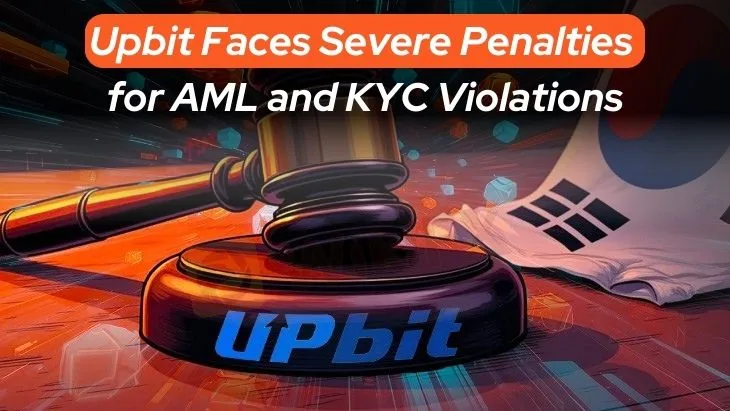Upbit Faces Severe Penalties for AML and KYC Violations
Abstract:Upbit, South Korea’s leading cryptocurrency exchange, faces severe penalties for over 700,000 AML and KYC violations.

South Koreas largest cryptocurrency exchange, Upbit, is facing sanctions from financial regulators for failing to meet Anti-Money Laundering (AML) and Know Your Customer (KYC) obligations. According to the Financial Intelligence Unit (FIU) under the Financial Services Commission (FSC), Upbit has been found responsible for as many as 700,000 cases of improper KYC implementation and conducting transactions with unregistered overseas virtual enterprises, violating the Act on Reporting and Using Specified Financial Transaction Information.
On January 9, the FIU issued a pre-sanction notice to Upbit, proposing a core measure to suspend its new customer-related operations for up to six months. While existing users‘ transactions will not be affected, the sanction could severely limit Upbit’s ability to expand its market presence. Furthermore, the exchange may face fines of up to KRW 100 million per violation, significantly increasing its compliance costs.
South Koreas Increasing Regulation of Virtual Assets
The penalty against Upbit is not an isolated incident but part of South Koreas broader effort to bring order to the virtual asset industry. Since the enactment of the Virtual Asset User Protection Act in July 2023, authorities have intensified oversight of exchanges to combat illegal and unfair market practices, promoting transparency and security in the sector.
As the market leader, accounting for over 70% of the country‘s trading volume, Upbit’s investigation has drawn significant attention across the industry. Smaller exchanges fear similar regulatory scrutiny and are tightening internal compliance measures. Through high-profile enforcement actions like this, the South Korean government aims to signal a tougher regulatory stance and lay the groundwork for a more comprehensive cryptocurrency compliance framework.
Future Implications: Upbits Licensing and Industry Impact
This sanction raises uncertainties regarding the renewal of Upbit‘s business license. Upbit’s license expired in October 2023 and is currently under review. The sanctions outcome could directly impact the renewal process and may result in stricter compliance requirements.
Additionally, the investigation revealed that Upbit engaged in business with unregistered overseas virtual enterprises without verifying their qualifications. Although Upbit attributed these issues to difficulties in assessing counterparties credentials, the lapses highlight gaps in its internal compliance system. This has fueled concerns about stricter measures from regulators for similar cases in the future.
Conclusion
The Upbit case represents a significant test for cryptocurrency exchanges and a push toward greater standardization within the industry. As the January 21 hearing approaches, the outcome will be closely watched for its implications on Upbit‘s operations and its broader impact on South Korea’s and the global cryptocurrency markets.
Read more

First Unfair Trading Case Reported Under South Korea’s Virtual Asset User Protection Act
The Financial Services Commission (FSC) of South Korea has disclosed the first case of unfair trading following the enactment of the Virtual Asset User Protection Act. This law, which took effect in July 2024, aims to regulate the cryptocurrency market and protect investors from fraud and market manipulation.

BitMEX Fined $100M in U.S. for Anti-Money-Laundering Violations
BitMEX fined $100M for anti-money laundering and KYC violations. The case highlights the U.S. crackdown on crypto platforms ignoring Bank Secrecy Act rules.

South Korea's Crypto Regulation Updates for 2025
South Korea's 2025 crypto regulations by the FSC focus on investor protection, stablecoin rules, and market transparency, addressing crypto tax delays and ecosystem reforms.

12 Chinese, 5 Filipinos Arrested in Paranaque Scam Operation
NBI arrests 12 Chinese nationals, and 5 Filipinos in Paranaque for scamming, bribery, cryptocurrency fraud, and violations of the Cybercrime Prevention Act.
WikiFX Broker
Latest News
How Long Can the Dollar Remain Strong?
Misleading Bond Sales Practices: BMO Capital Markets Fined Again by SEC
Italy’s Largest Bank Intesa Sanpaolo Enters Cryptocurrency Market
What Every Trader Must Know in a Turbulent Market
Forex Price Trend Prediction! | Come be a New Year Price Winner!
HFM NY Special Offer!
How a Promised RM1.4 Million Return Turned into a Costly Scam
Cinkciarz.pl Under Fire: Frozen Accounts, Missing Funds
First Unfair Trading Case Reported Under South Korea’s Virtual Asset User Protection Act
“Predict and Win” Big Rewards! Join the Contest Now
Rate Calc

